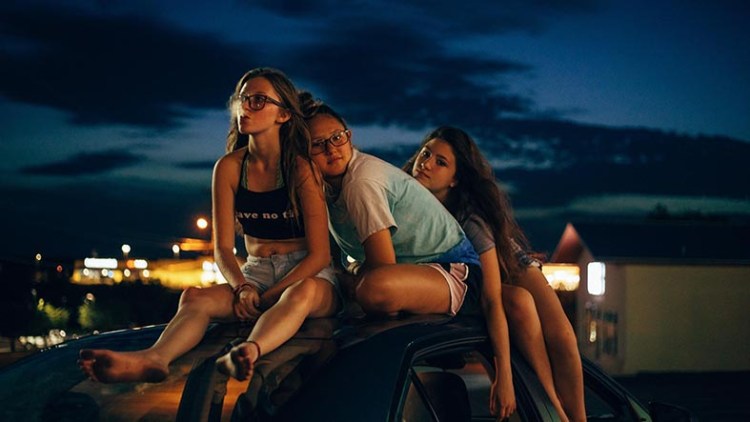Brittney, Aalloni and Autumn are living a teenage dream in “Cusp,” an alternately intoxicating and deeply distressing documentary set in a small Texas town during one torrid summer.
Newly liberated from school, the three 15- and 16-year-olds intend to spend their break running wild, getting high, hooking up and generally avoiding parental authority. All legs, hair and hormones, they allow two photographers – Isabel Bethencourt and Parker Hill – to follow their exploits, resulting in a chronicle rich in detail and candor and without judgment.
Following their subjects into bedrooms, parties, random fast-food runs and aimless searches for the next party, Bethencourt and Hill have produced a portrait that feels simultaneously specific and universal – a portrait of the inchoate desires and heedlessness that have always been a part of adolescence, as well as a snapshot of a particular point in time when such impulses feel breathtakingly high.
Anyone who’s familiar with teenage girl culture will recognize these extraordinarily charismatic protagonists: bespectacled, self-possessed Autumn; competent and confident Aalloni; and the more childlike Brittney. But appearances can be deceiving: You don’t have to be a prude to find it slightly shocking when Brittney sees the family swimming pool being prepared for the season and she announces that she’ll soon be out there “with a beer and a blunt.”
It’s even more dismaying when Bethencourt and Hill train their cameras on the girls’ relationships with the (usually older) boys in their lives, their interactions ranging across a toxic spectrum of casual dismissal and disrespect to outright assault.
The most stunning sequence in “Cusp” is set at a party where the soft-spoken Brittney is trying to bring attention to the rape of a member of the group’s social circle; she’s reflexively drowned out, and Hill and Bethencourt underline the loss of her voice both visually and by way of a smart, intuitive sound design. The filmmakers, who discovered their subjects while on a photography trip from Montana to Texas, possess an innate eye for beauty and lyricism, whether in the form of a sensational prairie sunset or their coltishly carefree protagonists. In the finest vérité tradition, they somehow manage to keep a respectful arm’s length while burrowing into what look like the most intimate 2 a.m. moments of their subjects’ sometimes chaotic lives. (If the scene with Brittney is heartbreaking, a later moment involving an Only Fans-like site triggers unalloyed terror.)
The adults in “Cusp” are either absent, keeping a somewhat wary distance or, in the case of Aalloni’s mother, trying desperately to keep her connection open by being a “cool mom.” Those efforts might seem cringeworthy or misguided, until their full sobering context becomes clear.
“Cusp” exists in a continuum of similarly themed films, from the 2016 documentary “All This Panic” to such narrative features as “Thirteen,” “Mustang” and, more recently, “Cuties.” But Bethencourt and Hill bring their own poetic lens and evenhanded sensibility to a moment in time that, even now, feels fleeting and archaic: In one of the film’s later scenes, Aalloni’s little sister becomes a teenager, signaling the beginning of a new cycle – with even more punitive contours in present-day Texas.
In this mesmerizing, revelatory and deeply compassionate film, viewers are left with an indelible impression of girlhood at its most precarious and indomitable.
Send questions/comments to the editors.



Success. Please wait for the page to reload. If the page does not reload within 5 seconds, please refresh the page.
Enter your email and password to access comments.
Hi, to comment on stories you must . This profile is in addition to your subscription and website login.
Already have a commenting profile? .
Invalid username/password.
Please check your email to confirm and complete your registration.
Only subscribers are eligible to post comments. Please subscribe or login first for digital access. Here’s why.
Use the form below to reset your password. When you've submitted your account email, we will send an email with a reset code.